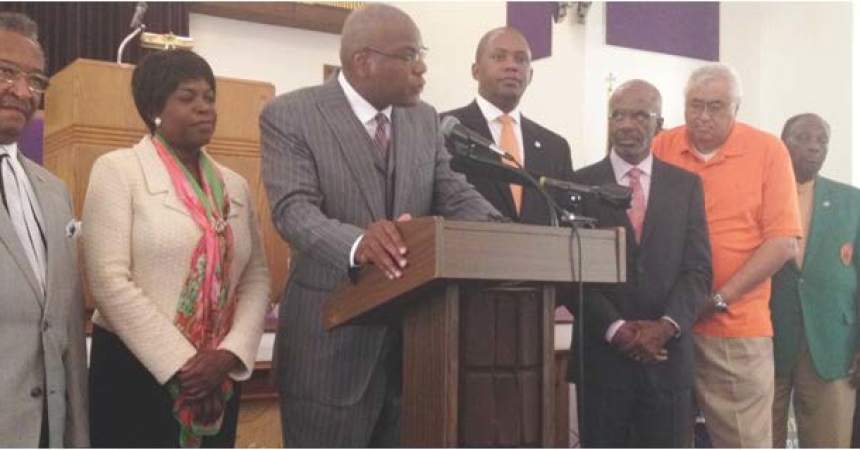
Former FAMU Presidents Appeal for Harmony

Rev. R.B. Holmes addressed the media, saying that the gathering of former FAMU presidents showed their “commitment to building a better, great and stronger FAMU.”
Photo by St. Clair Murraine
By St. Clair Murraine
Outlook Staff Writer
It might have been the setting of the sanctuary inside Bethel Missionary Baptist Church that had participants – one after another – expressing harmony during the Aug. 27 news conference.
They gathered in front of a throng of reporters as a prelude to a recognition banquet later in the evening that hailed the legacy of seven former living FAMU presidents and the university’s current leader Elmira Mangum. An estimated 400 people packed into FAMU’s grand ballroom for the event, a fund-raiser for FAMU’s athletic department.
The Bethel Empowerment Foundation staged the banquet as part of its effort to raise $100,000. But money wasn’t even a part of the conversation when the honorees met the media.
Solidarity was the main topic.
Frederick Humphries who served the longest of any of the seven (1985-2001) was most succinct in making the case for cohesion in moving the university forward.
It was obvious that Humphries, whose era was arguably the best times in recent years for the university, was concerned about a highly publicized spat between Mangum and Board of Trustees chairman Rufus Montgomery.
Near the end of a 10-minute speech, Humphries looked to Mangum on his right and Montgomery on his left with a specific message.
“It is now the responsibility of you and the chairman, Rufus,” Humphries said, looking at Mangum. “So, do a good job. Stay together and remember you’ve got all of us to back you up.
“You can call on anybody standing up here to help move the agenda forward. We love all of you; not one over the other. All of you. You have our university in your hands. Use us.”
While Montgomery was brief in his remarks, Mangum concurred with what Humphries would say later.
“The legacy of Florida A&M is important for us to protect and also for us to build upon for our students in the future,” she said, “making sure that our brand continues throughout the 21st century.”
While there might be some challenges in doing so, FAMU could overcome them just as it has many times in its 100-year history, former interim president Larry Robinson said.
“I can only imagine on Oct. 3, 1887 what challenge our founders faced,” he said. “What challenges did they face during the great depression and during the era of Jim Crow.
FAMU persevered (because) those individuals had what it took; they had a vision to get us where we are today. I think it’s our responsibility now to ensure that wasn’t in vain.”
Humphries cited several other events in FAMU’s history, including university students’ participation in the Montgomery (Ala.) march, to make his cause for the legacy of the school.
Walter Smith, whose term ran from 1977-1985, used a more personal story to illustrate the need for harmony among the school’s current leaders. He talked about how, as a boy, he would follow his father on campus with a mule and cart picking up trash.
“If we don’t unify, FAMU will fall apart like a lot of the HBCUs who have not been able to retain their strength,” Smith said. “You saw some people stand here today who are strong FAMUans.”
“We must find a way to have cement that will not break; that will not separate. We must learn to continue to be the greatest institution in the world.”
Mangum moved the conversation to the future of FAMU when she announced that Robinson would head up a strategic planning committee. Robinson was interim president before Mangum took over last year.
Robinson said the assignment before the committee is to prepare a road map to implement the university’s message, focusing on how to get to their goals through a comprehensive process that will include stakeholders and students.
“We have to define (goals) and one of the mechanisms that we will use is a series of meetings to hear from stakeholders (concerning) what are the important things we need to focus on from 2015 forward, with regard to being the most effective university that we can,” he said.
Throughout the ceremony that followed later, participants praised the effort of the Bethel Foundation and expressed their appreciation, still emphasizing their earlier call for unity.
“Our legacy is vested in the success of this institution,”
Humphries said. “Our legacy depends on it.”







